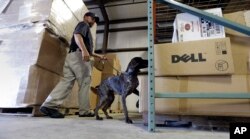America is expected to face a shortage of workers in some jobs.
Some lawmakers, however, are worried that not enough people are being trained to be able to do the work.
For example, in 2024, America will need 9.2 million wind turbine workers -- twice as many as in 2014.
The United States also will need millions of additional health workers. People are needed to do the work of physical therapists, home health aides and nurse practitioners.
The information about America’s future job needs comes from a recent report by the United States Labor Department. It was a desire to prepare people to fill these high-demand jobs that led the House of Representatives to pass a bill to update a 1984 law.
The 33-year-old law sets federal policy for education that prepares people for jobs, many of which require technical skills.
The new bill gives America’s 50 state governments more freedom on how they can use federal money to prepare people for jobs.
Supporters of the legislation say it encourages states to work more closely with local business leaders. The goal is to set up classes and programs that better prepare people for jobs in which demand for workers is expected to be highest.
Congresswoman Virginia Foxx is a Republican from the southern U.S. state of North Carolina. She also is chairwoman of the House Committee on Education and the Workforce.
Foxx said about 6 million jobs are now going unfilled because they require technical skills and knowledge most people looking for work do not have.
“If we want to help participants move from government assistance and hold a job, then we must set them on a path toward jobs and industries that are currently and will remain competitive,” Foxx said.
Bill passes House, but needs Senate approval
The House of Representatives passed the bill, called the “Accelerating Individuals into the Workforce Act,” by a vote of 377 to 34. The bill now must pass the Senate before it can go to the White House for President Donald Trump’s approval or veto.
Some Democrats said the bill is helpful. But they say it does not do enough to prepare people for technical and health jobs.
Congressman Lloyd Doggett is a Democrat from the American southwestern state of Texas. He said, “This one very modest bill that does not add one new dollar to address the challenges that those who want to rise from welfare to work need.”
The bill sets aside $100 million from a current job training program for one year, Doggett said.
At a House hearing in February, some people suggested that students are not being encouraged to sign up for job training programs offered by two-year colleges. Instead, most students are encouraged to enter four-year colleges that often do not provide technical job training.
Mike Rowe heads mikeroweWORKS Foundation, an organization that helps people seeking job skills. He also is a host of the television shows “Dirty Jobs” and “Somebody’s Gotta Do It.” He spoke about his own career training during a February hearing of the House Subcommittee on Early Childhood, Elementary and Secondary Education.
“A four-year school would have been a huge mistake at that point in my life. I was 17-years-old. I had no money and I had no idea what I wanted to do. The local community college offered hundreds of courses in my price range, so that’s where I went. And that experience opened doors, I didn’t even know existed...”
The Labor Department reported that employers are expected to increase hiring in health care, including eye and ear care.
Other high-demand jobs include truck drivers, personal finance advisors and internet developers.
I'm Bruce Alpert.
Bruce Alpert reported on this story for VOA Learning English. Mario Ritter was the editor.
We want to hear from you. Write to us in the Comments Section and share your views on our Facebook Page. Do you think your education is helping prepare you for a job once you graduate?
______________________________________________________________
Words in This Story
wind turbine - n. a tall structure that has large blades attached to an engine and that is used to produce electricity
physical therapist - n. a worker whose job it is to help people with physical pain or health needs
nurse practitioner - n. a nurse who is trained to do some of the things a doctor does -- such as give physical exams or order certain medical tests
encourage - v. to make someone more determined, hopeful, or confident
participant - n. a person who is involved in an activity or event
accelerate - v. to move faster
modest - adj. not very large in effect or impact
challenges - n. to test the ability, skill, or strength of someone
welfare - n. a program that provides financial assistance to very poor people






